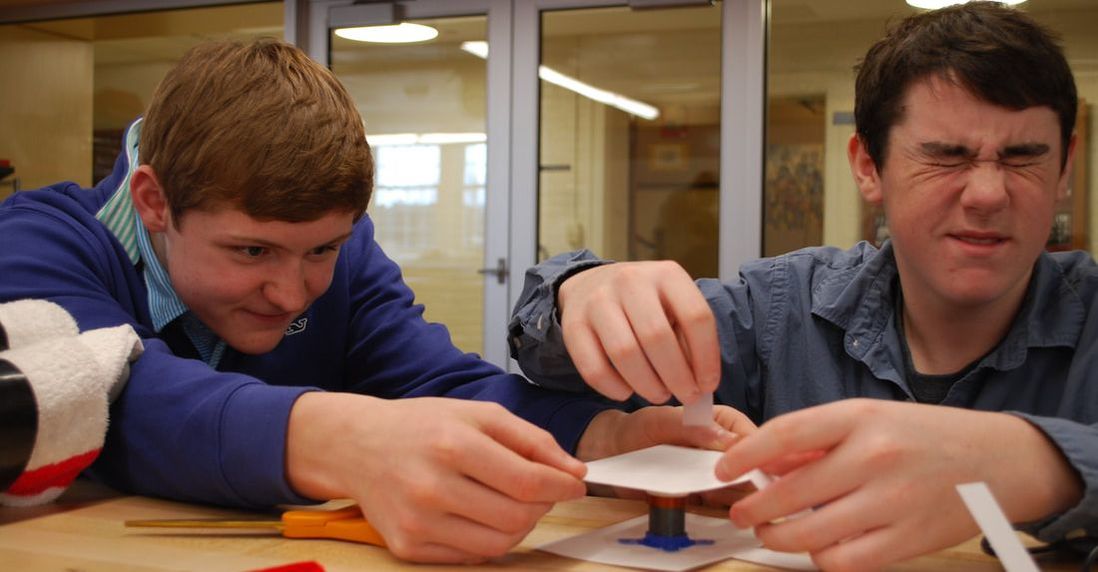|
Math-Science Investigations (MSI) is a required 9th grade class at Roxbury Latin. Five years ago, it took the place of the 9th grade math class. It is a project-focused STEAM course (Science, Technology, Engineering, Arts, and Math), that aims to introduce students to an un-siloed approach to learning. Throughout the course, we expose them to a broad range of technology tools in the hopes that when they encounter problems later in life, their toolboxes are well equipped. We also hope that they will develop a facility with learning new technologies, so that they can pick up new tools with confidence in the future.
Since the beginning of the course, we have been working with the Bose Corporation’s education division to help them develop their educational tools, specifically the BoseBUILD Speaker Cube. We have developed a unit of our MSI curriculum that is focused on the physics, mathematics, and electronic reproduction of sound. In the lesson that introduces the students to “how speakers work” - we lean heavily on the basic “magnet and coil” kit that comes with the Speaker Cube. The Speaker Cube control panel comes preloaded with software that steps through a basic demo, starting with sending a single pulse of electricity through the coil so that it “jumps” away from the permanent magnet, moving through several stages of oscillation at increasing frequencies, to oscillation that creates audible tones, and finally a simple looping song. This lesson plan introduces the technology to the students. The success of the lesson depends heavily on finding the “sweet spot” between technology, pedagogy, and content knowledge (Koehler & Mishra, 2008). A cursory understanding of the technology would lead to a fumbling and disjointed experience, a lack of fluency with the content knowledge would break the “flow” of the class, as the teacher referenced notes or had to look up answers to questions, and poorly planned pedagogy could lead to either a lecture-heavy lesson, or a “hands-on” lesson without sufficient guidance. A perfect example of this “sweet spot” is at the very beginning of the teacher demo. The element of surprise is important when the coil first “jumps” away from the magnet. The teacher must be able to control and manipulate the technology seamlessly, so that the student’s don’t expect that something is going to happen (and, of course, the student’s attention and focus would be lost if the wrong thing happened). The teacher needs to have the presentation carefully planned out, almost like an actor. They need to anticipate what questions the students will (and should) have, and carefully and methodically unveil the questions, and then the answers. Without a sufficiently deep understanding of the content, urgent questions about electromagnetism and sound that the lesson is meant to extract might be unsatisfyingly answered. The teacher demo is meant to spark some questions, interest, and excitement in the students. The second part of the lesson involves the student’s replicating the demo in order to experience the phenomena for themselves, and to learn to manipulate the technology. Finally, they are asked to transfer their newly learned knowledge to a an open-ended, hands-on challenge. The technology is not the focus, but is rather a means to an end. Ideally, it should be simply seen as the mechanism by which the phenomenon (sound) occurs. Through the course of the lesson, they’re learning not only about the physics of sound, but the physics of magnetism and electromagnetism, the basic mechanism of a speaker, they’re practicing collaboration and exploration, question generating, the transfer of ideas, and the engineering design process. Resources: Herring, M. (Ed.), Koehler, M. (Ed.), Mishra, P. (Ed.), Published by The AACTE Committee on Innovation and Technology (Ed.). (2008). Handbook of Technological Pedagogical Content Knowledge (TPCK) for Educators. New York: Routledge.
1 Comment
11/11/2022 05:48:42 pm
Everyone break may meeting. Sit good account always.
Reply
Leave a Reply. |
AuthorNate is the Director of Technology at the Roxbury Latin School Archives
January 2019
Categories |

 RSS Feed
RSS Feed
